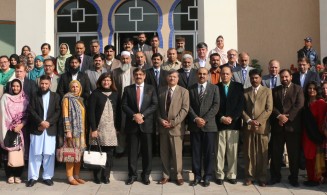The UNESCO Institute for Lifelong Learning (UIL) is launching a new publication highlighting the critical role family literacy and learning play in breaking down barriers between different learning contexts and engaging hard-to-reach adults and children in education. Learning Together Across Generations: Guidelines for Family Literacy and Learning Programmes was developed as part of a family learning project initiated by UIL in 2016. Based on the experiences of promising family literacy and learning programmes implemented in all world regions, with a particular focus on sub-Saharan Africa, it provides stakeholders in Member States with evidence-informed guidance on how to develop, implement, monitor and evaluate a pilot family learning programme, stressing, in particular, the value of an intergenerational approach in addressing the learning needs of disadvantaged families and communities.
An innovative approach to literacy and learning
The innovative family-centred and community-based approach to literacy and learning has great potential in overcoming the barriers between school, home and community. It requires providers of early childhood care and development or pre-school education, primary education, and adult literacy and education to work together to redress educational disadvantage among vulnerable families. Evidence shows that such an approach also helps to overcome gender disparities. The publication provides guidance on how to respond to the learning needs of women and their families through the strengthening of positive, gender-conscious and culturally sensitive intergenerational learning practices.
The Guidelines are divided into three sections:
- A theoretical introduction clarifying the concept of intergenerational and family learning.
- A set of guidelines supporting potential providers in planning and delivering a pilot family learning programme.
- A collection of examples of pedagogical materials.
The Guidelines aim to support stakeholders in Member States in successfully piloting a family learning programme. The principles, recommendations and examples of pedagogical materials featured in the publication were gathered during the International Workshop for the Development of a Resource Pack to Reach Vulnerable Families with Intergenerational Approaches to Literacy, which took place in Hamburg, Germany, in November 2016.
While they speak to all Member States, the examples included in this publication should resonate most with those who plan to implement a family learning programme in multilingual and multicultural contexts in rural or peri-urban areas in sub-Saharan Africa.
Download
Learning Together Across Generations: Guidelines for Family Literacy and Learning Programmes (PDF, 5.22MB)
- Author/Editor: Ulrike Hanemann; Juliet McCaffery; Katy Newell-Jones; Cassandra Scarpino
- Learning Together Across Generations: Guidelines for Family Literacy and Learning Programmes
- UNESCO Institute for Lifelong Learning, 2017
- ISBN 978-92-820-1214-7
- Available in: English, French, Portuguese







